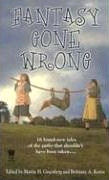Recently I read an article in the local paper profiling a woman who started a small press publishing company. She characterizes the venture as a “pay-to-publish” service. She doesn’t attempt to hide the fact that any author whose book she accepts will pay out of their own pocket for editorial and production services and costs. Distribution and promotion is the responsibility of the author, or those services are available for an additional fee.
I don’t have any problem with this. She’s straight-forward about what she’s doing. A writer goes in knowing it will cost them money. It’s a choice the writer must make. I don’t think it’s a good choice, and my husband, writer J. Steven York, has written about why on his blog http://york-multiplex.blogspot.com/2008/12/vanity-isnt-easy.html
What bothered me was the rationalizations she gave for why her service was a good alternative to traditional publishing. They are the same ones I see every time the subject of vanity presses comes up.
I call them the No-Hope Publishing Plan.
Why? Because they all hinge on the assertion that the writer has no hope of being published by a traditional publisher. You know, the kind that send you checks instead of the other way around.
And just what are these No-Hope “facts”?
“Nobody buys a book from a first-time writer.” Oooookay. This is impossible. If “nobody” buys a first book, there cannot be any books sold. Logically, every writer ever published sold a first book. Maybe not the first one they wrote, but that isn’t what the no-hope brigade claims. Stephen King sold CARRIE, Tony Hillerman sold THE BLESSING WAY, Stephanie Meyer sold TWILIGHT, and Nora Roberts sold IRISH THOROUGHBRED. Even J.K. Rowling sold HARRY POTTER AND THE SORCERER’S STONE. They were all first books.
“You can’t sell a book without an agent.” Really, No-Hope Brigade? I just sold three myself, and I know a lot of other writers who have managed similar things. You want an agent for a lot of other reasons, but it simply isn’t true that you can’t sell without an agent.
“You can’t get an agent if you haven’t sold a book.” Look around. There are agent blogs all over the ‘Net, and every one of them trumpets when they sign a new writer who has bowled them over with a fantastic book.
“Publishers only want books from best-sellers.” Walk into any bookstore in this country, even the tiny ones. There are a lot of shelves in there. Even a writer as prolific as Nora Roberts or Stephen King or James Patterson can’t fill all those shelves. Somebody else has to write some of those books.
“Writers can’t make any money. The publisher gets it all.” Traditional publishing contracts call for an advance against royalties. Royalties means the writer gets a percentage of every sale made. When that total exceeds the pre-payment (“advance”), the writer start getting checks. Checks that will continue to come as long as the book continues to sell. If you write a really good book, those checks keep coming for a long time – even after you die. The publisher absorbs all the up-front costs, including your advance, and doesn’t start making money until all those costs are recovered.
“The publisher can change your title.”
“The publisher can edit your book without your permission.”
“The publisher can put whatever cover they want on your book and you have no say, even if it’s awful.” These are all things that can happen. If you let them. Each of these, and many more, are subject to negotiation when you and the publisher work out the contract. This is where your agent really earns their commission, helping you negotiate the best possible contract terms. The No-Hope Brigade will tell you that you don’t have any control. Not true. The publisher can’t do any of these things without your permission in the form on a legal contract.
Every one of these arguments boils down to a single argument: You have no hope as a writer, and the only way you will ever see your book in print is to give me a pile of money.
Don’t believe them. Don’t let the No-Hope Brigade take your dreams – and your money.
You deserve better.
Bundle Up and Escape! (With Bonus Short Story, and Author Outing at the
End!)
-
We all need an escape now and then, and I am delighted to be able to offer
my readers the opportunity to leave their daily stress behind and visit my
char...
8 years ago














